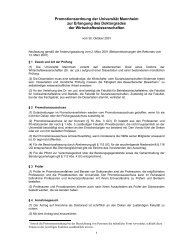The returns to cognitive and non-cognitive abilities in Germany
The returns to cognitive and non-cognitive abilities in Germany
The returns to cognitive and non-cognitive abilities in Germany
Create successful ePaper yourself
Turn your PDF publications into a flip-book with our unique Google optimized e-Paper software.
Plug, 2006). Agreeable <strong>in</strong>dividuals may be extremely cooperative <strong>and</strong> may hence sacrifice<br />
their career by be<strong>in</strong>g nice <strong>to</strong> others for example by avoid<strong>in</strong>g conflicts.<br />
[Table 1 about here]<br />
In contrast <strong>to</strong> prior expectations we f<strong>in</strong>d no statistical relationship between<br />
neuroticism <strong>and</strong> wages. This may be because we control for an <strong>in</strong>dividual’s attitude <strong>to</strong>wards<br />
reciprocal behavior. S<strong>in</strong>ce neuroticism <strong>and</strong> reciprocity are l<strong>in</strong>ked (Ash<strong>to</strong>n et al., 1998) it may<br />
well be that the results for neuroticism as found <strong>in</strong> previous research are reflected <strong>in</strong> the<br />
<strong>in</strong>dica<strong>to</strong>rs of reciprocity here. <strong>The</strong>se are <strong>in</strong> fact more robust <strong>in</strong>asmuch as there is statistical<br />
significance across all specifications with the exception of negative reciprocity which is not<br />
related <strong>to</strong> females’ wages. Female workers who score high <strong>in</strong> positive reciprocity earn about<br />
3% more, which <strong>in</strong>creases <strong>to</strong> about 6% when adjust<strong>in</strong>g for measurement error. Somewhat<br />
lower premiums of about 1% <strong>to</strong> 2% are found for males. <strong>The</strong>se results are consistent with the<br />
f<strong>in</strong>d<strong>in</strong>gs of Dohmen et al. (2009) for their sample of male <strong>and</strong> female workers. While they do<br />
not f<strong>in</strong>d a statistical relationship between negative reciprocity <strong>and</strong> labor <strong>in</strong>come, our results<br />
show that male workers’ negative reciprocity is rewarded <strong>in</strong> the labor market. Interest<strong>in</strong>gly<br />
though, females receive slightly lower wage premiums for negative reciprocity, <strong>and</strong> the<br />
coefficients are not statistically significant. This result may not appear plausible but, as<br />
outl<strong>in</strong>ed above, negative reciprocity <strong>and</strong> agreeableness (or rather <strong>in</strong>verse agreeableness) are<br />
probably measures of the same underly<strong>in</strong>g personality trait. It hence may well be the case<br />
that, for males, the effect of this trait works through negative reciprocity rather than through<br />
agreeableness.<br />
<strong>The</strong> rema<strong>in</strong><strong>in</strong>g personality trait <strong>in</strong> our analysis, external locus of control, is the most<br />
robust <strong>and</strong> strongest predic<strong>to</strong>r of wage differentials: Individuals who believe that the<br />
outcomes they experience are beyond their control have some 4% lower wages which<br />
<strong>in</strong>creases <strong>to</strong> penalties of 10% for females <strong>and</strong> some 7% for males <strong>in</strong> the EIV models.<br />
21















